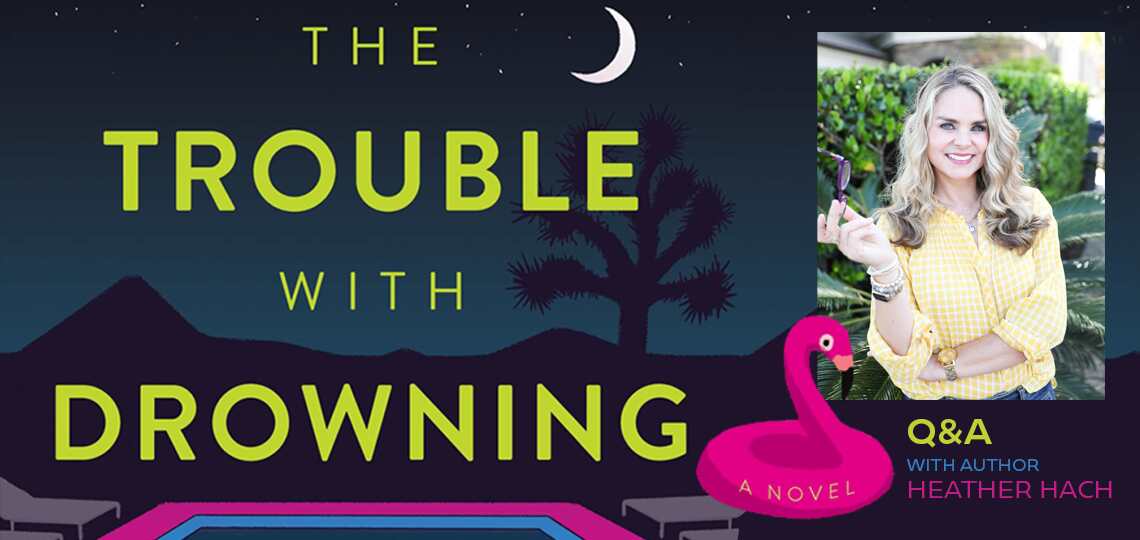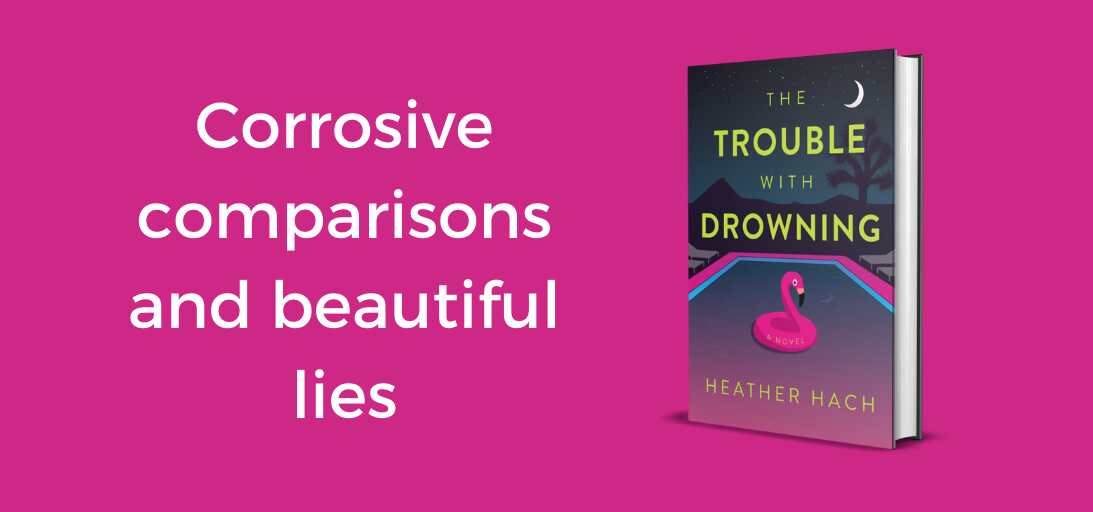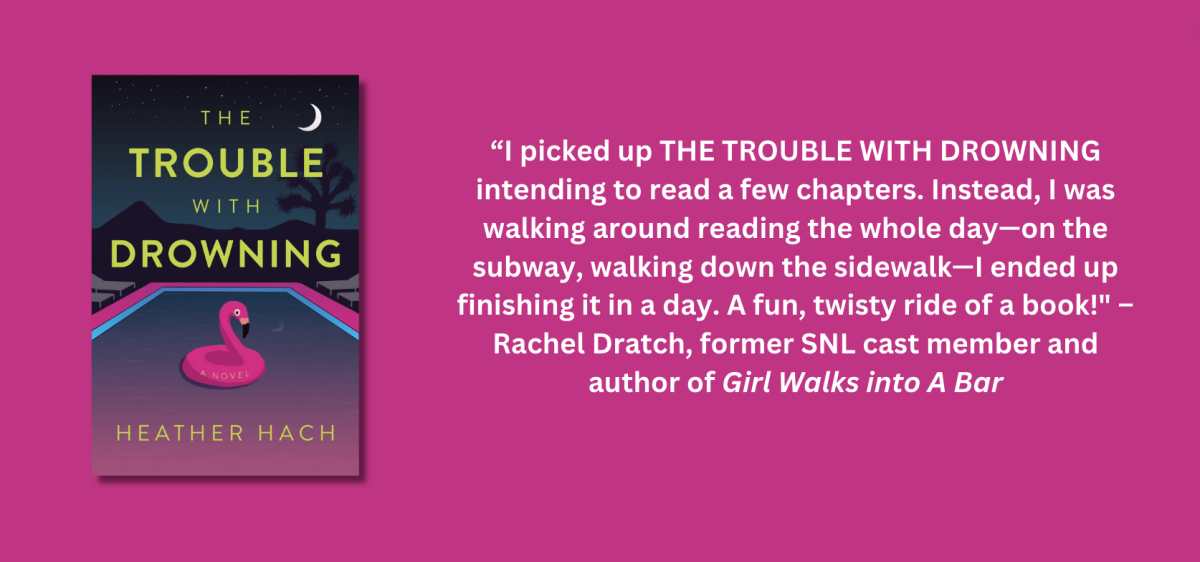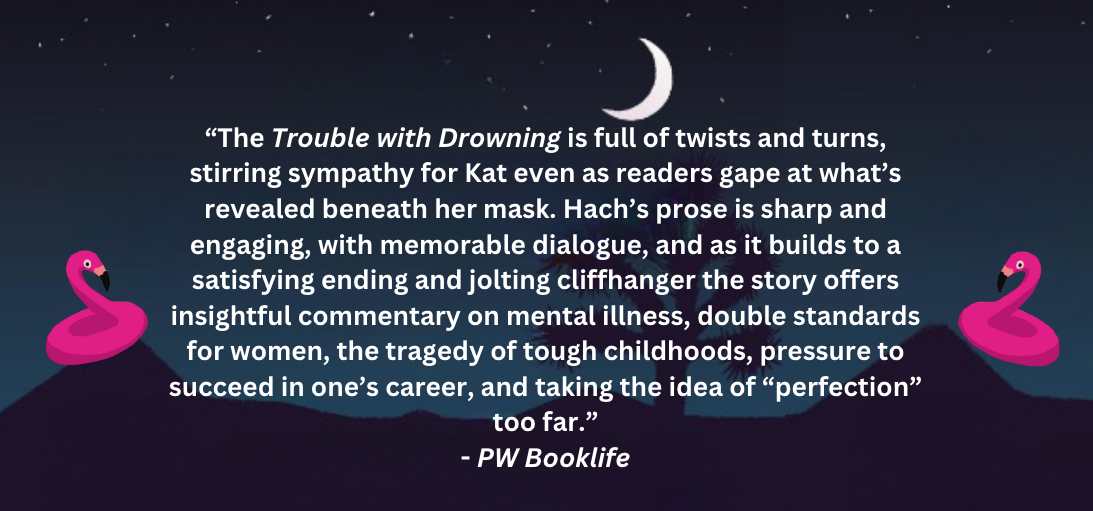Tony-nominated writer of Legally Blonde: The Musical, Heather Hach, on her new psychological thriller

An Interview with Heather Hach, Author of The Trouble with Drowning
To conjure up the spine-chilling stuff of a good thriller often calls for an author to go to dark places. In fact, it might be a prerequisite. You can’t create a convincing psychopath, for example, unless you’re willing to explore the workings of a troubled mind. Heather Hach, we feel for you.
The author of The Trouble with Drowning, Heather admits that her troubled protagonist Kat forced her to sift through her own “darker impulses.” But what adds complexity to Heather’s creative process is that she, herself, has struggled with mental health issues, something she readily admits in the book’s front matter. We can only imagine that the deep dive into such a compelling story as The Trouble with Drowning might have pushed a few buttons that Heather would have preferred to avoid.
Intrigued, impressed, and interested in learning more, we reached out to Heather with a few questions.
You wrote most of this novel during the peak of COVID—what was that experience like? How did the tone during that time influence the type of story you wanted to tell?
We all went through the strangest, scariest event with COVID. I argue we are still going through PTSD because of it and it’ll be decades before we truly understand the impact. The pandemic definitely heightened my sense of panic and horror, so it’s no wonder I decided it was the perfect time to dive into a psychological thriller. And as terrible as COVID was—being scared to grocery shop for god’s sake!, seeing the deaths spike, watching our country fray apart—but there were also wonderful glimmers of hope and light. We all got to pause, to slow down (not all of us, but a lot of us did). I was allowed to sleep more, which always makes me happy and more creative.
Crafting this novel was my escape valve during a volatile time—I created my own reality on the page to step out of my actual reality in life. I exorcised my anxiety by plotting devious plot turns and also tamped my hamster wheel mind by tapping away on the computer. Writing was my salvation, once again.
The novel shifts between a few different character perspectives. Which was your favorite perspective to write? And if the answer is different, who was your favorite character to write?
It was most fun to write the main character, Kat, but she was also the most difficult to nail down. Kat’s the center of the novel, most of the plot revolves around her, but she’s also the most troubled. Kat is an enigma within a puzzle wrapped in a mystery, and she was confounding to conceive but also satisfying when I felt I was being true to her pathos. I loved the challenge of humanizing and sympathizing with someone who did some pretty revolting things. It was cathartic to walk in a troubled mind and safer to explore those impulses from afar. I felt when Kat was spiraling, she would literally take my hand and lead me down some dark corridors. I remember forgetting to eat lunch I’d be so lost in bringing the world in my head to life on the page, and I rarely forget food. I love lunch.
In the author’s note at the beginning of the book, you mention some of your personal struggles with mental health. How did those experiences reflect in those of your characters? What message about dealing with mental health do you hope readers will take away after reading the book?
I think everyone struggles with mental health at some point of their life (and day!) if they’re being honest. It’s hard to be alive in this messy, confusing world! I do believe I’m a grounded person, but I have also always been highly imaginative and energetic. I’m sure if I was a kid today, I would have been diagnosed with some attention disorder (certainly a math disability!). I struggle daily with trichotillomania which is chronic hair pulling disorder, and I’ve battled with having bald patches on my head during anxious times in my life. I’m proud to report I’m on medication and for the most part, I’m steady. But bottom line, I am sympathetic to those who suffer.
The brain is an organ like any other. My struggles with mental health are tiny compared to how others suffer, and I realize my experiences do not begin to approach what Kat is facing as a character. In the novel, she is diagnosed with schizoaffective disorder bipolar type. Obviously, I have no idea how grueling it is to suffer from this monster of a mental condition. I did research and hope I didn’t do the condition a disservice. My intention was not to demonize mental health struggles or suggest those who suffer from it are bound to commit crimes. Clearly, that’s not the case. But it is sometimes the case that troubled people can do troubling things. I hope I’ve painted an empathetic picture of Kat—I genuinely love her—but part of my message is also if you need help, get it. Don’t be a hero and try to manage your own symptoms. Experts are available to assist people in finding an equilibrium, and my novel is an endorsement for embracing help.
The book deals with jealousy, obsession, and perfectionism, often through the lens of online admiration. For Kat, she lets this comparison consume her entire life. In this age of social media and being “chronically online,” how do you think people can cope with this constant pressure to compare themselves? Is it possible to truly overcome those feelings?
This novel allowed me to explore some of my own darker impulses and also my more embarrassing tendencies. We all have a rational mind and the more monster mind. Since I was a little girl, I’ve been convinced certain people have secrets to life I do not. That others know what they’re doing and that they’re perfect. Of course, I know this is irrational and wrong, but when you see someone smiling from Instagram with some spectacular vista behind them, other realities can appear seamless. We are slammed with visuals of how it’s all supposed to look and be. I even think the advent of all these house design shows have given us anxiety—why doesn’t my kitchen have brass fixtures and what is wrong with me and my life? Unfortunately, inferiority sells a lot of product.
Social media has made this so much worse, and I’m at once aware of it and also a reluctant participant. I hired a professional to help me with Instagram and TikTok to promote my book that’s critical of social media I am trying to denounce! On some level, this contradictory reality is the heart of the problem our society faces, and within my book itself. But social media isn’t going anywhere. It’s engrained into our reality, and hopefully we can take steps to modulate our interaction with it. Heightening our logic brain is paramount—but lord knows logic and social media don’t always have the coziest of relationships.
How did your experience as a screenwriter influence how you approached writing this book? Are there similarities in the processes, or are they totally different?
Writing a screenplay and writing a novel are at once nothing alike and completely similar. At the end of the day, it’s the same goal: tell a good story. You just have to utilize the inherent tools and conceits of each medium to mine them to the full effect. Screenplays are all about action and helping the reader bring your movie to life in their mind. Novels are more interior and much more about showing motivation through subtleties of character. Screenplay is macro, novels are micro … but you’re still trying to achieve the same thing, which is to take a person on a journey by sending your main character through some serious tests.
The setting of the book takes place in Tucson, Arizona. What made you choose this location as a backdrop? How do you think it impacts the book?
I went to the University of Arizona for two years before I transferred to the University of Colorado (where I graduated from). Ultimately, Arizona wasn’t the best fit for me but I truly loved the heartiness and uniqueness of Tucson. I made a wrong choice going there, but it led me to all the other right choices in my life. I always say life is not just about finding out who you are, it’s also about finding out who you are not. Tucson was a nostalgic, specific setting to dip back into, but I thought the starkness of the desert really served as a great backdrop for someone struggling so mightily. Kat is scrappy, and so is the desert. Tucson is also gorgeous and filled with devastatingly lovely vistas; I love the juxtaposition of its cragginess and also its beauty. Ultimately, Tucson is a metaphor for the duality of Kat.
The title of the book, The Trouble with Drowning, references a peak moment where Kat is overtaken by her obsessive need for love and attention. How did you choose the title, and what does it reveal about the lesson of the book?
Drowning is obviously about being engulfed, either by water or otherwise. It’s about being taken down, it’s about losing breath, it’s about the end. I nearly lost my son to a drowning accident, and it was a searingly horrid experience. It all happened so, so quickly, which is also how life-changing moments can happen. The line between being here and not is far murkier than we’d like to believe.
The title is about Kat drowning in her own obsession for Jacob and in dysfunction itself. When you’re in a bad place, nothing makes sense. Light cannot be found, and spiraling can feel like drowning. I battled with the title (the original title was I Am You, which was apparently like too many other books), but when I thought of The Trouble with Drowning, I knew it was the one. It felt like it encapsulated the theme of the book but was also sophisticated and mysterious. I wanted people to hear the words in their head and feel the mood of the psychological thriller in the title itself.
This is your adult novel debut; do you have any plans for a future book? Do you think you would stick to psychological thrillers, or try something else?
I’m working on my new novel entitled Relationship Goals, which is more of a dramedy. It’s been a fun process (until I recently received notes from my editor and now I’m doubting everything!) but different tonally. This new work is lighter but on some level I’m struggling with it more than my psychological thriller! I adore reading thrillers, so I know I’ll return to the genre. I want to write in as many capacities as possible. Thus far, I’ve done just that—I have two movies, one Broadway musical, one YA novel and one adult psychological thriller novel. I’d like to keep myself—and audiences—guessing, if I’m lucky enough to continue working in the wild, wonderful life of creating universes on the page.
Barbara Hodge



